What is Latent Semantic Indexing & Why Does it Matter for Your SEO Strategy?
If you're anything like me, you probably read the title of this post and thought, "Latent semantic indexing ... wait, what is that?"
Latent semantic indexing (LSI, for short) can be an overwhelming and confusing term for anyone hearing it for the first time.
Luckily, although it sounds like something that requires a degree in computer science, it's actually a concept you're already probably familiar with — particularly if you have some basic knowledge of keywords and their close relationship with search engine optimization (SEO).
In this post, we'll define LSI and how the process can potentially benefit your overall SEO strategy, take a closer look at ways to find LSI-driven keywords, and outline how to add these keywords into your content.
Let's dive right in, shall we?
Access Now: Technical SEO Glossary
What is latent semantic indexing?
Latent Semantic Indexing, also known as latent semantic analysis, is a mathematical practice that helps classify and retrieve information on particular key terms and concepts using singular value decomposition (SVD).
Through SVD, search engines are able to scan through unstructured data and identify any relationships between these terms and their context to better index these records for users online.
Before SVD, it was rather difficult for computers to try and grasp differences between synonyms or semantic changes.
To help paint a picture, take the words "silly" and "string". When separated, these words represent two very independent definitions, but when brought together, their formation creates a brand-new concept: "silly string".
If you work for an e-commerce company that sells silly string, you don't want your content arising for the word "silly" alone — in that case, you'd need to use LSI keywords to help let search engines know for which searches they should serve up your content.
As technology adapted, the quality of user search was highly improved due to stronger patterns in relevancy. Through "stemming", computers began taking into account the various forms a word could represent on a page.
Depending on the site's content, Google would then serve up results based off relevancy (not using mind-reading, but something called LSI keywords).
Search engines use LSI keywords to help add context to pages in order to provide better search results.
As LSI became more sophisticated, the ability to group thematically came into place, which for many rank-driven content writers meant synonyms became your best friend.
So ... the more ranking LSI keywords, the better your overall position, right? Well, it depends.
What are LSI keywords?
LSI keywords are based off the idea that using similar keywords throughout your content to strengthen your topic or theme can help boost your overall SEO performance.
After all, if you end up ranking for one keyword, the possibility of you ranking for a related keyword sounds reasonable.
However, that necessarily isn't always the case. There is quite a bit of contradictory analysis challenging how much LSI truly boosts your content.
As Google and other search engines have become more sophisticated and advanced, we have learned there are many outside factors that influence overall ranking.
In fact, there is no certainty behind the idea that LSI is a part of Google's ranking algorithm. LSI is a practice dating back to the 1980s and in this day and age, we know Google's too smart to rely on just synonyms to retrieve and index information.
So the power of "LSI keywords" comes into question. There are arguments, that even if Google isn't using LSI, there is no damage done in adding synonyms to your content, so long as they are not overstuffed and used naturally.
So what are a couple ways to help boost SEO that doesn't rely on LSI?
- Use structured data! There is nothing Google likes better and will reward than data that users can understand. For more information on what structured data is and how to add it to your website check out the Beginner's Guide to Structured Data for Organizing & Optimizing Your Website.
- Practice co-occurrence, which relies on concept relativity, frequency in keyword occurrence, and closeness in keywords across different websites. Search engines will tend to use this method to scan and index websites most closely related. Therefore, if you're looking for a place to start, you should:
- Identify a long-tail keyword or phrase you would like to rank for
- Research the top trending articles
- Find which concepts or keywords they have in common
- Incorporate and optimize on your findings!
Now, this doesn't mean LSI driven keywords are bad for SEO, it just means it shouldn't be your catch-all. In fact, there are a multitude of ways your content can benefit from LSI keywords. So let's dive a little deeper into how you can use LSI content to your advantage.
Benefits of LSI-Driven Keyword Research
Search engines are constantly hunting for the most relevant and thorough content for a given query. The internet is much like the universe, ever expansive and well, big. That said, it’s not an easy task for even the best of search engines, like Google to determine what a page’s content is really about.
Better targeted categorization helps publishers, marketers, and users alike. For example, publishers can boost engagement since LSI-driven content is directed and selected for a specific audience. Online users mutually benefit since the queries they’re searching for are served up quicker and more accurately.
And, at the end of the day, users who find content that answer their questions are happy users, and happy users are more likely to engage or convert.
5 Ways to Find LSI Keywords
You're one step closer to becoming an LSI expert. Congrats! Now that you’ve learned a little bit on the importance of LSI keywords, let's walk through the various ways you can identify new keywords for upcoming blog posts and content.
1. A Simple Google Search
One of the easiest ways to find LSI keywords is Google itself. When you enter a term in the search query field, it automatically shows the keywords related to the particular query.
Let's use the earlier example of "silly string" again. An initial search of the word provides these results:
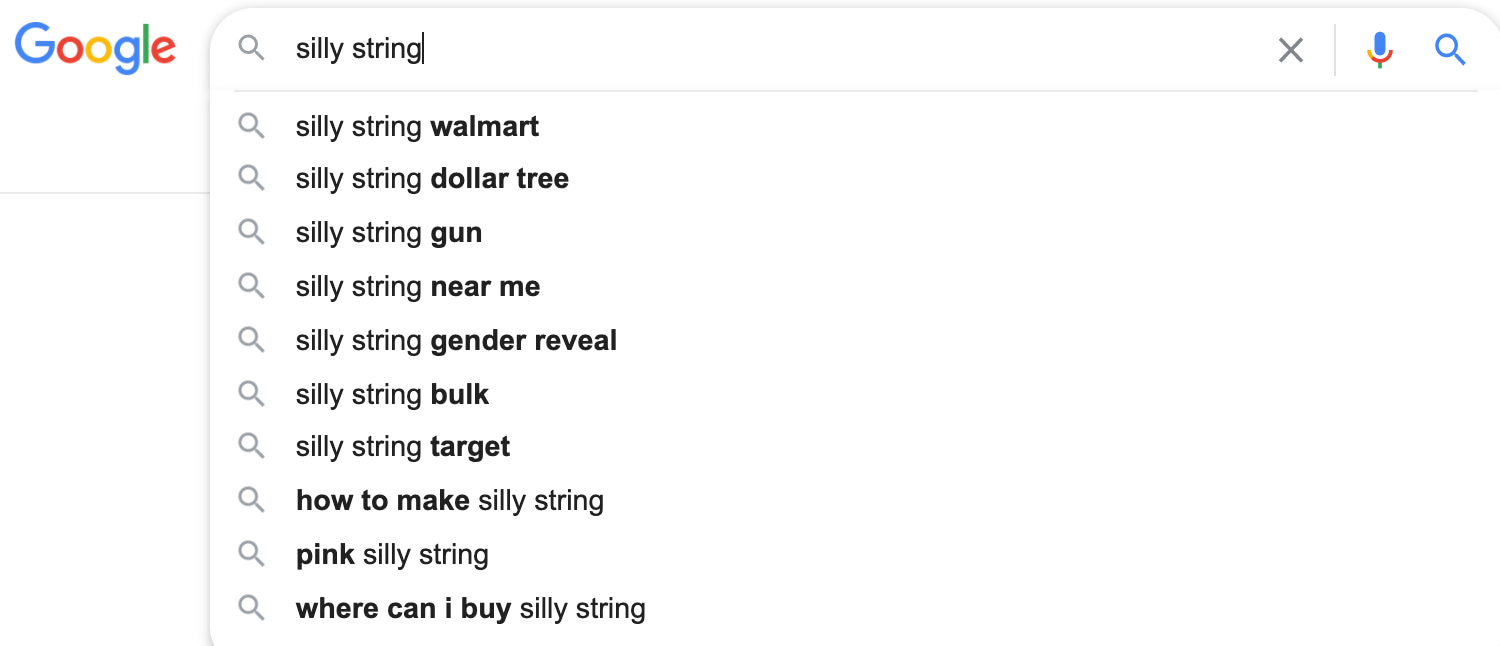
Again, there are a lot of pages this particular keyword could point to which is why we need to use LSI to add more context. If you continue to scroll down to the bottom, you'll find a section titled, "Searches related to" and your given query:
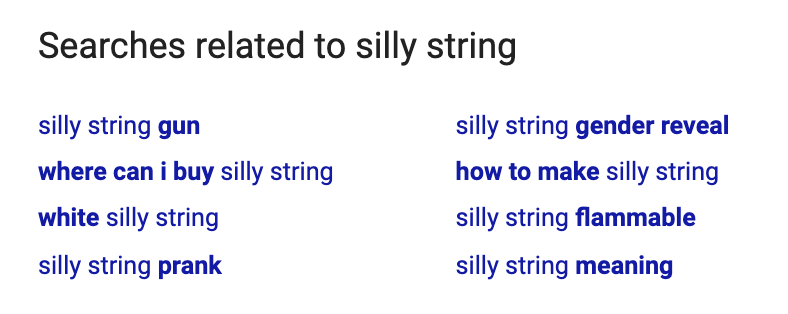
Use the list of keywords as a starting point for potential LSI keywords because it reveals what Google already associates with your primary keywords.
The best part? This method is 100% free!
2. Use the Keyword Planner Tool via Google AdWords
If you have access to Google AdWords, you can also use their Keyword Planner tool.
Again, we'll use the "silly string" example. Begin by adding the term into the initial query box. Click "Get ideas" and you'll be redirected to a page that offers related keywords and an idea of how competitive search rankings are for said term.
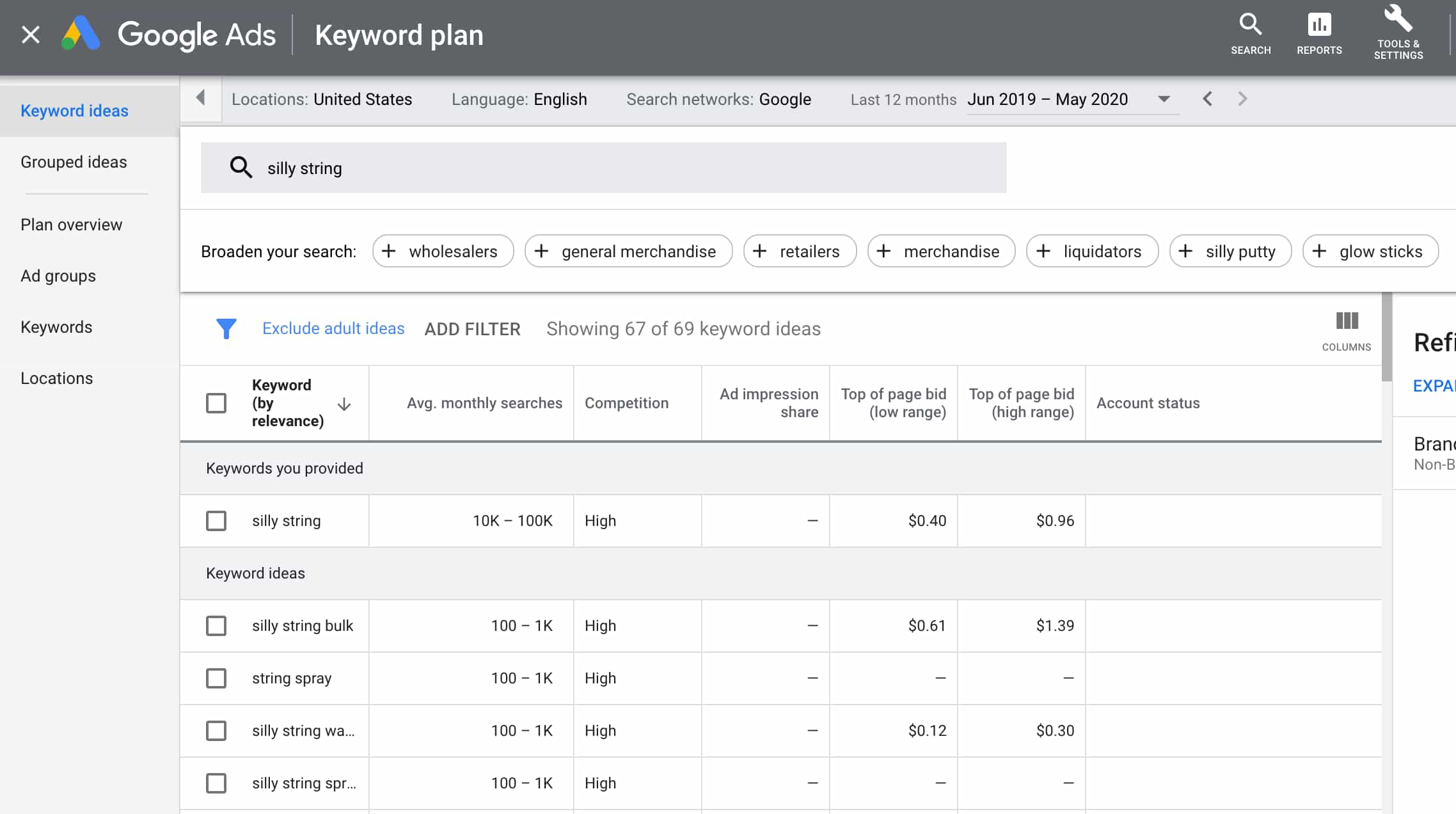
3. Take Advantage of SERP Stat's Keyword Research Database Tool
Another free tool for you to use comes from SERP Stats. SERP Stat's Keyword Research Database Tool is very similar to Google's Keyword Planner. Simply add your query into the search bar and you'll receive results based on volume of searches and CPC.
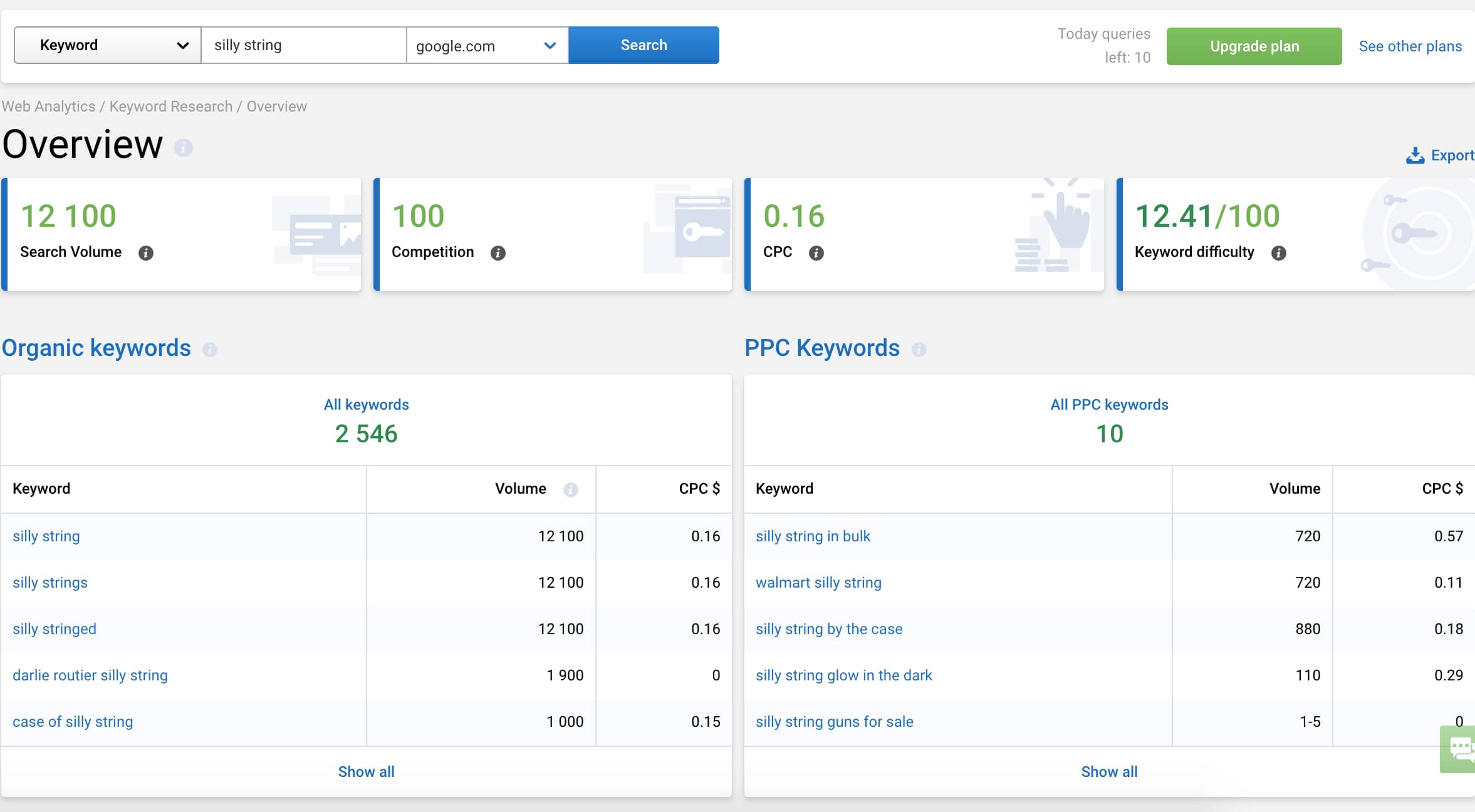
4. Use the LSI Keyword Generator
The LSI Graph/LSI Keyword Generator is another free tool that’s perfectly made for identifying LSI keywords. Similar to the previous tools mentioned, it follows the same rinse and repeat process. Add a term into the search bar, click “generate” and choose from a variety of related keywords below.
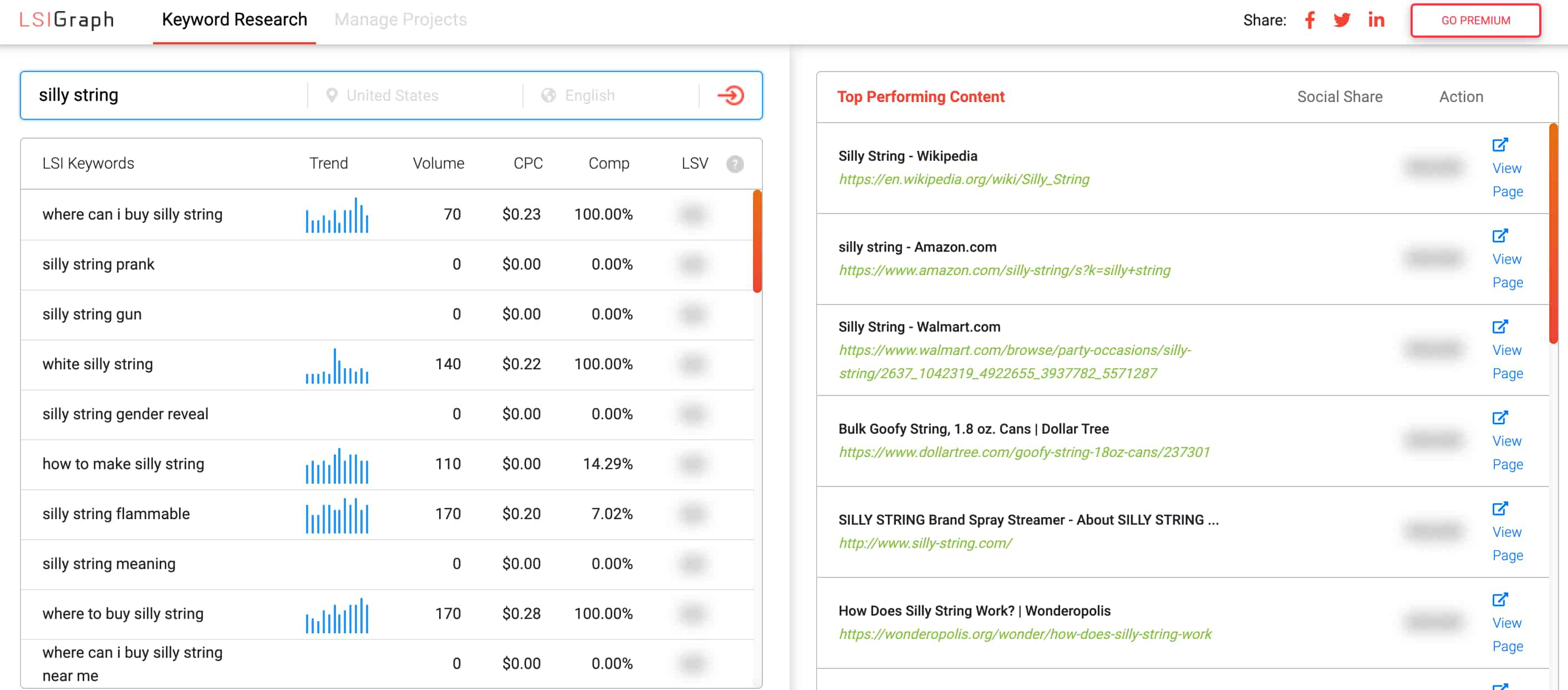
5. Try Ubersuggest
Lastly, another freebie to discover LSI keywords with is Ubersuggest. I’m sure at this point, you can guess how simple each of these tools are. All you need to do is enter you primary keyword, and Ubersuggest does the rest! From search volume, keyword difficulty, and CPC, you can expect a generated list of related search terms.
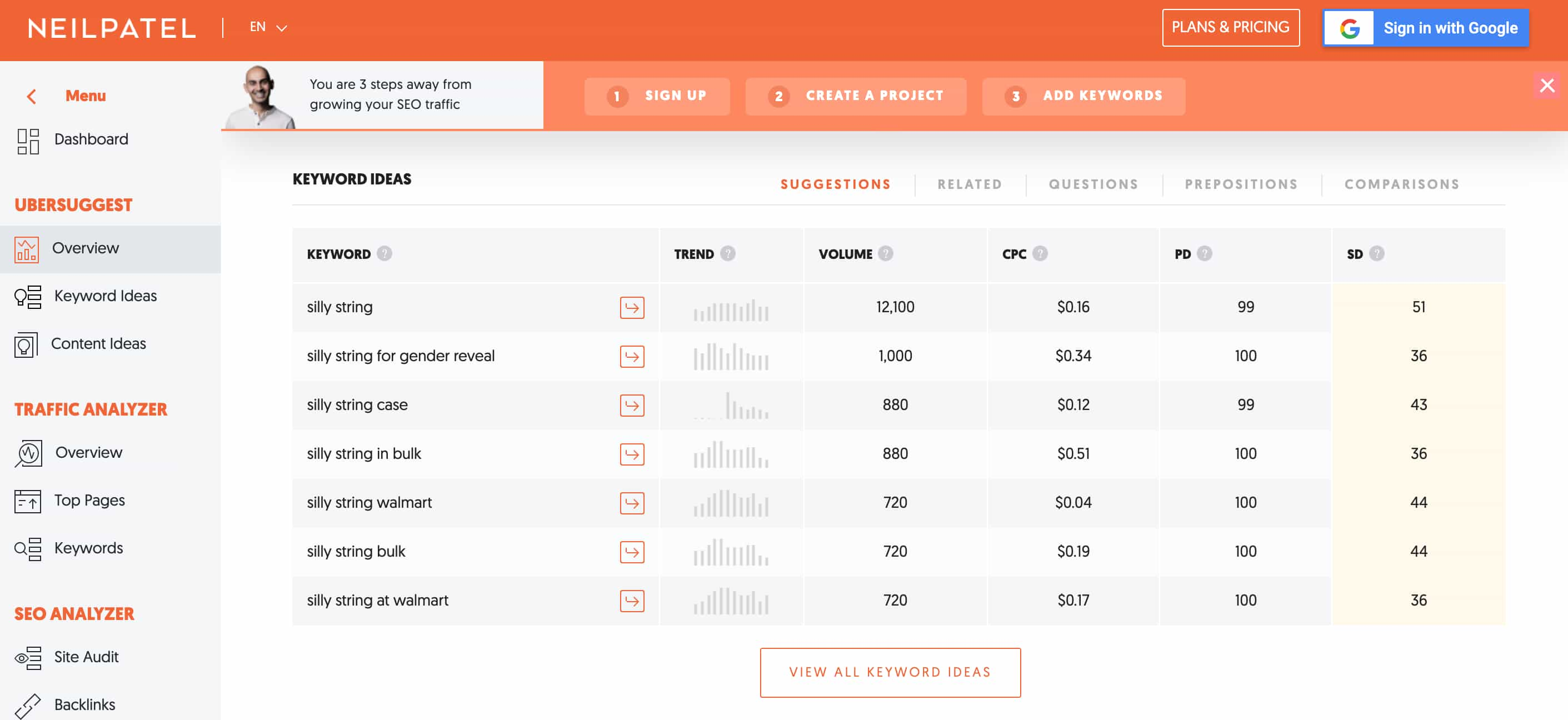
How to Select (and Use) the Best LSI Keywords
By this point, it's likely (and normal) to have a long list of potential LSI keywords. The best way to cherry pick the finest keywords is to narrow down your options to those keywords that are most related to your content and have a sufficient search volume. Extra points if you can determine those golden nugget keywords with both high search volume and low keyword difficulty.
Understand the Three Different Types of Intent
It’s vital that your LSI keywords help answer any questions people might have about your primary keyword, so be sure to do some research on your target audience to figure out the types of queries they might put into Google to find your content.
We'll refer back to "silly string" again, this time in the context that it's on a site dedicated to exploring "how silly string works". Below are three different types of intent someone on Google might have when searching for "silly string":
- Informational intent: This type of query is typically on a much broader scale. An example would be, "How does silly string work?"
- Navigational intent: This is a more specific type of query. For instance, someone might want to know who invented silly string, or what it's made out of.
- Transactional intent: This type of query relates to purchasing something. In regards to our example, it could be related to purchasing silly string.
Choose Words That Add Context, But Don’t Overstuff
A misconception some people have is that you should use as many LSI keywords as possible to give your content a better chance at outranking others.
This is called overstuffing your content, and it's a practice you'll want to avoid because it could actually deter you from ranking. The best way to make sure your content isn’t overstuffed is to reread your content once all the keywords are added. If a specific word doesn’t sound natural, leave it out.
Remember That LSI Is Only Part of an Effective SEO Strategy
LSI is just potentially one of many factors that determine how well your content ranks in search engines. To achieve the best results and set your content up for success, an effective SEO strategy should also consist of proper website architecture, relevant backlinks, ongoing optimizations, etc.
With that said, it's definitely worth taking the time to discover and add relevant LSI-driven keywords into your content, particularly since it can help your readers find the most relevant, helpful information to meet their needs, faster.
from Hubspot
Comments
Post a Comment